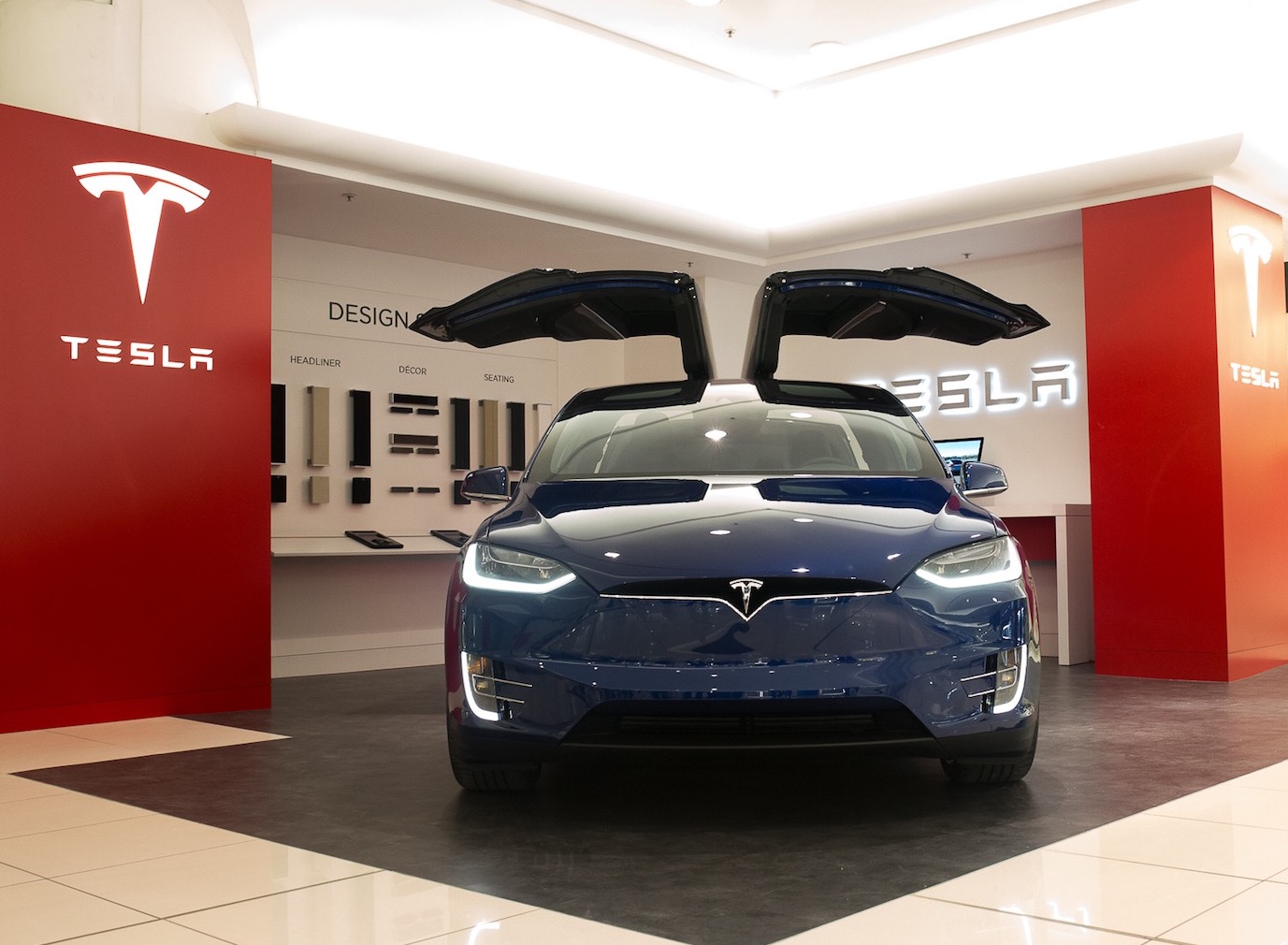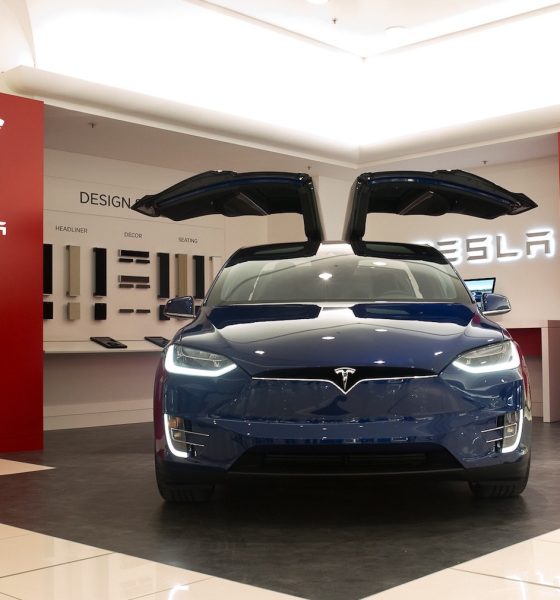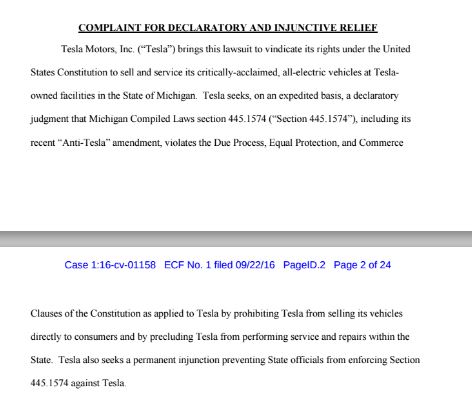

News
Michigan argues Tesla “never sought the ability to directly sell” within state
Michigan officials have filed a response to a Tesla federal lawsuit which alleges that the state has unfairly denied the Silicon Valley-based electric car company from selling cars within the state. At issue is a “Anti-Tesla” amendment that prevents the company’s effort to “sell and service its critically-acclaimed, all-electric vehicles at Tesla-owned facilities” in that state.
The state says they have an entirely different interpretation and call Tesla’s version “incorrect.” Michigan requires that vehicles must be sold through a franchised dealer. Today’s state response includes Michigan’s argument that Tesla “has never sought the ability to directly sell its vehicles in Michigan but only licenses to operate dealerships.”
In an email to The Detroit News today, Tesla said, “If it’s the state’s position that Tesla can sell its cars directly to consumers, Tesla welcomes that opportunity and invites the state to work with us so that we can start serving our customers in Michigan as soon as possible.”
Of course, the Big Three automakers — General Motors, Ford Motor Company, and Fiat Chrysler Automobiles US— have their headquarters in the Detroit area.
An October 2014 Michigan state law bans automakers from selling vehicles directly to consumers. The Michigan Legislature, backed by the state’s new-car dealership lobby, voted strongly in favor of the amendment, which has come to be known as the “anti-Tesla” bill. Many believe that the law was intended to close a loophole that Tesla has used in other states to maintain company-owned retail stores and bypass the dealership route. Tesla’s complaint outlines that the “only conceivable reason” for the law is “to reward the dealers’ generous lobbying efforts by handing them a monopoly.”
Tesla seeks two things in its lawsuit. To start, it is asking for a declaratory judgment that Michigan’s ban on direct-sales violates the Due Process, Equal Protection, and Commerce Clauses of the Constitution as applied to Tesla. The law, Tesla says, prohibits it from selling its vehicles directly to consumers, and it also precludes Tesla from performing service and repairs within the State. Moreover, Tesla wants a permanent injunction preventing state officials from enforcing the law, including the October 2014 amendment.
What’s the state’s retort? The state argues a 2000 state law would not have allowed Tesla to sell its vehicles, and Tesla wasn’t incorporated until three years later. “The statutory scheme that plaintiff claims discriminates against plaintiff has existed in its current form since before plaintiff existed as a company,” the state says in its response.
The Michigan Secretary of State’s office had denied Tesla’s new-dealership license request in September. The governor had declared that the law “clarifies and strengthens” an existing long-standing prohibition of new car direct sales in Michigan. Soon after, on September 22, 2016, Tesla filed the lawsuit in federal court in western Michigan against three individuals: Governor Rick Snyder, Michigan Secretary of State Ruth Johnson, and Attorney General Bill Schuette. The state contends that none of these individuals has “violated any of plaintiff’s constitutional rights, or any rights whatsoever.”
Earlier this month, Tesla opened a Troy gallery showroom, housed within a Nordstrom department store. With an artistic atmosphere, the 700-square-foot space includes a Model X SUV for consumers to scrutinize. However, no sales can be made at the site. Instead, customers must head online for product details and ordering information.
Governor Snyder commented about the Tesla-Nordstrom gallery with a politician’s finesse. “That’s a legal issue that I’ve said would be a good topic for the Legislature to look at, to say what about new manufacturers and those issues. I would encourage our Legislature to look at (Tesla’s gallery surrogate showroom) when they deem appropriate.”
Tesla is requesting a jury trial.
“Tesla will continue to fight for the rights of Michigan consumers to be able to choose how they buy cars in Michigan. Giving auto dealers a monopoly on car sales benefits them, but harms consumers,” said Tesla in a statement.

Cybertruck
Tesla drops latest hint that new Cybertruck trim is selling like hotcakes
According to Tesla’s Online Design Studio, the new All-Wheel-Drive Cybertruck will now be delivered in April 2027. Earlier orders are still slated for early this Summer, but orders from here on forward are now officially pushed into next year:

Tesla’s new Cybertruck offering has had its delivery date pushed back once again. This is now the second time, and deliveries for the newest orders are now pushed well into 2027.
According to Tesla’s Online Design Studio, the new All-Wheel-Drive Cybertruck will now be delivered in April 2027. Earlier orders are still slated for early this Summer, but orders from here on forward are now officially pushed into next year:
🚨 Tesla has updated the $59,990 Cybertruck Dual Motor AWD’s estimated delivery date to April 2027.
First deliveries are still slated for June, but if you order it now, you’ll be waiting over a year.
Demand appears to be off the charts for the new Cybertruck and consumers are… pic.twitter.com/raDCCeC0zP
— TESLARATI (@Teslarati) February 26, 2026
Just three days ago, the initial delivery date of June 2026 was pushed back to early Fall, and now, that date has officially moved to April 2027.
The fact that Tesla has had to push back deliveries once again proves one of two things: either Tesla has slow production plans for the new Cybertruck trim, or demand is off the charts.
Judging by how Tesla is already planning to raise the price based on demand in just a few days, it seems like the company knows it is giving a tremendous deal on this spec of Cybertruck, and units are moving quickly.
That points more toward demand and not necessarily to slower production plans, but it is not confirmed.
Tesla Cybertruck’s newest trim will undergo massive change in ten days, Musk says
Tesla is set to hike the price on March 1, so tomorrow will be the final day to grab the new Cybertruck trim for just $59,990.
It features:
- Dual Motor AWD w/ est. 325 mi of range
- Powered tonneau cover
- Bed outlets (2x 120V + 1x 240V) & Powershare capability
- Coil springs w/ adaptive damping
- Heated first-row seats w/ textile material that is easy to clean
- Steer-by-wire & Four Wheel Steering
- 6’ x 4’ composite bed
- Towing capacity of up to 7,500 lbs
- Powered frunk
Interestingly, the price offering is fairly close to what Tesla unveiled back in late 2019.
Elon Musk
Elon Musk outlines plan for first Starship tower catch attempt
Musk confirmed that Starship V3 Ship 1 (SN1) is headed for ground tests and expressed strong confidence in the updated vehicle design.

Elon Musk has clarified when SpaceX will first attempt to catch Starship’s upper stage with its launch tower. The CEO’s update provides the clearest teaser yet for the spacecraft’s recovery roadmap.
Musk shared the details in recent posts on X. In his initial post, Musk confirmed that Starship V3 Ship 1 (SN1) is headed for ground tests and expressed strong confidence in the updated vehicle design.
“Starship V3 SN1 headed for ground tests. I am highly confident that the V3 design will achieve full reusability,” Musk wrote.
In a follow-up post, Musk addressed when SpaceX would attempt to catch the upper stage using the launch tower’s robotic arms.
“Should note that SpaceX will only try to catch the ship with the tower after two perfect soft landings in the ocean. The risk of the ship breaking up over land needs to be very low,” Musk clarified.
His remarks suggest that SpaceX is deliberately reducing risk before attempting a tower catch of Starship’s upper stage. Such a milestone would mark a major step towards the full reuse of the Starship system.
SpaceX is currently targeting the first Starship V3 flight of 2026 this coming March. The spacecraft’s V3 iteration is widely viewed as a key milestone in SpaceX’s long-term strategy to make Starship fully reusable.
Starship V3 features a number of key upgrades over its previous iterations. The vehicle is equipped with SpaceX’s Raptor V3 engines, which are designed to deliver significantly higher thrust than earlier versions while reducing cost and weight.
The V3 design is also expected to be optimized for manufacturability, a critical step if SpaceX intends to scale the spacecraft’s production toward frequent launches for Starlink, lunar missions, and eventually Mars.
News
Tesla FSD (Supervised) could be approved in the Netherlands next month: Musk
Musk shared the update during a recent interview at Giga Berlin.

Tesla CEO Elon Musk shared that Full Self-Driving (FSD) could receive regulatory approval in the Netherlands as soon as March 20, potentially marking a major step forward for Tesla’s advanced driver-assistance rollout in Europe.
Musk shared the update during a recent interview at Giga Berlin, noting that the date was provided by local authorities.
“Tesla has the most advanced real-world AI, and hopefully, it will be approved soon in Europe. We’re told by the authorities that March 20th, it’ll be approved in the Netherlands,’ what I was told,” Musk stated.
“Hopefully, that date remains the same. But I think people in Europe are going to be pretty blown away by how good the Tesla car AI is in being able to drive.”
Tesla’s FSD system relies on vision-based neural networks trained on real-world driving data, allowing vehicles to navigate using cameras and AI rather than traditional sensor-heavy solutions.
The performance of FSD Supervised has so far been impressive. As per Tesla’s safety report, Full Self-Driving Supervised has already traveled 8.3 billion miles. So far, vehicles operating with FSD Supervised engaged recorded one major collision every 5,300,676 miles.
In comparison, Teslas driven manually with Active Safety systems recorded one major collision every 2,175,763 miles, while Teslas driven manually without Active Safety recorded one major collision every 855,132 miles. The U.S. average during the same period was one major collision every 660,164 miles.
If approval is granted on March 20, the Netherlands could become the first European market to greenlight Tesla’s latest supervised FSD (Supervised) software under updated regulatory frameworks. Tesla has been working to secure expanded FSD access across Europe, where regulatory standards differ significantly from those in the United States. Approval in the Netherlands would likely serve as a foundation for broader EU adoption, though additional country-level clearances may still be required.









